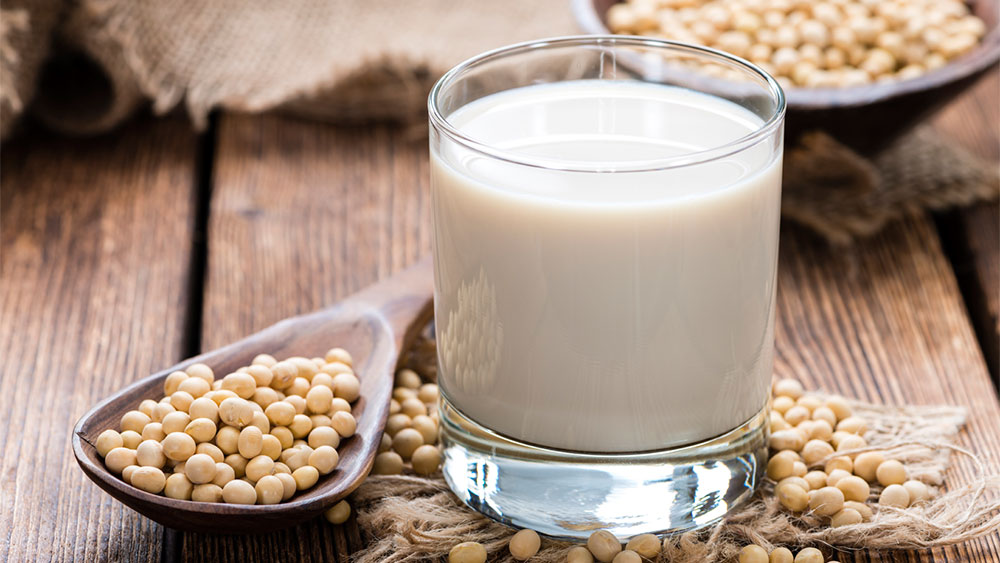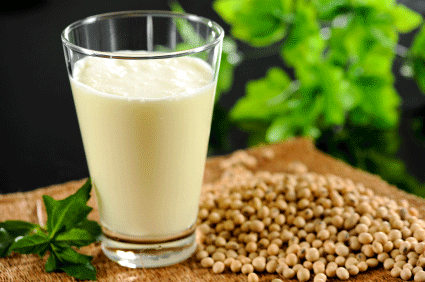Soy milk is a kind of plant milk obtained by soaking, straining and subsequently, grinding the soybeans. The soy milk is a rich source of proteins, essential fatty acids, fiber and a variety of nutrients and minerals.
Soy milk helps lower the concentration of cholesterol within the body and helps prevent heart diseases. It is an excellent alternative to dairy milk for people who are intolerant to milk. People who want to incorporate soy milk in diet face a rather common question of whether or not soy milk is fattening.
Is Soy Milk Fattening?
No, soy milk is not fattening in itself. But remember, excess of everything is bad. Consuming soy milk in excessive amounts can also lead to the increase of body mass.
Dairy milk is loaded with saturated fats which tend to deposit in the blood vessels and clog them. Soy milk, however, contains unsaturated fats which do not block the blood vessels. The phytosterol present in soy milk prevents hypercholesterolemia by interfering with the absorption of cholesterol in the gut.
A cup of soy milk contributes 30% of the recommended daily intake of the vitamin B2 and 50% of vitamin B12. Both vitamins play key roles in energy production and fat metabolism. In this way, soy milk helps burn the excess fat stored within the body.
Nutrition Facts of Soy Milk
100 grams of soy milk yields 54 calories of energy whereas a cup full of soy milk (approximately 243 grams) contains 131 calories. Here is the in-depth nutrition profile of soy milk. Knowing the nutrition facts of soy milk will help to answer the question: Is soy milk fattening?
|
|
Amount |
Percentage Daily Value |
|
Total carbohydrates |
15 grams |
5% |
|
Proteins |
8 grams |
16% |
|
Total fat |
4.3 grams |
6% |
|
Cholesterol |
0 grams |
0% |
|
Vitamin B6 |
- |
10% |
|
Sodium |
124 mg |
5% |
|
Potassium |
287 mg |
8% |
|
Iron |
- |
8% |
|
Calcium |
- |
6% |
|
Magnesium |
- |
15% |
Health Benefits of Soy Milk
We have given the answer to "Is soy milk fattening?" Now it's time to introduce the health benefits of soy milk.
1. It Can Improve the Lipid Profile
 Unlike dairy milk which is loaded with saturated fats and cholesterol, soy milk is literally devoid of cholesterol and contains unsaturated fats. These unsaturated fats hinder the absorption of cholesterol into the blood circulation, thereby preventing high total body cholesterol levels.
Unlike dairy milk which is loaded with saturated fats and cholesterol, soy milk is literally devoid of cholesterol and contains unsaturated fats. These unsaturated fats hinder the absorption of cholesterol into the blood circulation, thereby preventing high total body cholesterol levels.
Clinical trials have shown that soy milk can decrease the concentration of the low density lipoproteins and triglycerides within the body, and elevate the concentration of high density lipoproteins, good fats which protect the heart. In this way, soy milk helps improve the lipid profile.
2. It Can Protect Blood Vessels
The fatty acids and phytochemicals in soymilk have potent anti-oxidant function that helps strengthen the blood vessels. By binding to the vessel walls, they protect the walls against the damage induced by free radicals. They also prevent the deposition of cholesterol in the form of plaques in the vessel wall. In this way, the likelihood of vessel wall lesions and vessel rupture with resultant hemorrhage is significantly reduced.
3. It Can Help Lower the Rate of Obesity
Incorporation of isoflavone-rich soy milk in diet has been proved to reduce metabolic obesity, a condition that commonly affects men and postmenopausal women. Isoflavones inhibit the synthesis of fats, thereby reducing the fat stores of the body. Besides, soy milk contains less sugar than regular milk. Therefore, soy milk can help lower the rate of obesity.
4. It Can Help Decrease the Risk of Prostate Cancer
Prostate cancer is a testosterone dependent tumor. Phytoestrogens in soy milk can interfere with the production of testosterone, and significantly reduce the risk of prostate cancer in men.
5. It Can Guard Against Postmenopausal Syndromes
Menopause is associated with a steep decline in the levels of the female hormone estrogen, and it may increase the risk of obesity, diabetes, cardiovascular disorders, depression, and psychological illnesses. Phytoestrogens in soy milk mimic the action of estrogen, thereby guarding against postmenopausal syndromes.
6. It Can Lower the Risk of Osteoporosis
Menopause in women is also associated with the risk of osteoporosis. Phytoestrogen component of soy milk improves calcium metabolism and strengthens bones by consolidating the bone mass.
Other Considerations of Soy Milk
By exploring the answer to "Is soy milk fattening?" and health benefits of soy milk, many people must want to include soy milk in their diet. But there are something you have to keep in mind before embarking on soy milk-rich diet:

1. It May Increase the Risk of Breast Cancer
Phytoestrogens in soy milk increase the risk of breast cancer in women who are taking tamoxifen. For such women, it is advised not to consume soy milk in excess.
2. It May Cause Soy Allergy
Sensitivity of immune system to soy proteins can lead to soy allergy which manifests as nausea, vomiting and abdominal cramps in the gut. Soy milk can also induce skin allergic reactions such as hives and eczema. Soy allergy can also take the form of respiratory symptoms like shortness of breath, wheezing and cough.
3. It May Be Bad for Infants
Infants have precise dietary needs that cannot be met with soy milk. During the first year, infants should only be fed on breast milk or formula milk, and soy milk should be avoided. After one year, soy milk can be introduced in babies’ diet as a weaning food.
4. It Influences the Thyroid Function
According to one of the researches, the isoflavones in soy milk reduce the iodine stores of the body. Since thyroid functions are dependent on iodine, excessive drinking of soy milk may lead to thyroid problems.
5. It May Hinder the Absorption of Mineral
Soy milk contains phytic acid which can interfere with mineral absorption in the gut especially that of calcium, magnesium, iron and zinc. Therefore, consuming too much soy milk may lead to deficiency of mineral.
6. It May Cause Flatulence
Soy milk components can inhibit the action of many enzymes involved in digestion of food, which can lead to indigestion and flatulence. Intolerance to soy proteins may also be the cause of gas and bloating associated with soymilk ingestion.
